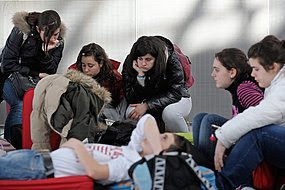Volcanic dust cloud shuts down British airspace

Qantas estimates flights to Europe and the UK will not be operating again until Sunday as a volcanic ash cloud blasting out of an Icelandic glacier caused massive disruptions to global air traffic.
The volcano under the Eyjafjallajokull glacier is spewing a plume of grey ash up to 10 kilometres high across the Atlantic, closing major airports more than 2,000 kilometres away in the most extensive shutdown of airspace since the September 11 attacks in 2001.
The entire airspace in the UK, Norway, Denmark, Belgium and Sweden is closed and there are partial closures in France and Finland.
Qantas has cancelled today's flights to London and Frankfurt and over 1,500 travellers are now stranded in Singapore, Hong Kong and Bangkok airports waiting for a connecting flight.
Airline spokesman David Epstein says passengers trying to get to Europe from Australia should not fly to Asia as all hotels there are booked out.
He says passengers travelling in the next few days should not go to the airport unless the airline has directed them to do so.
"We'd urge you to go to qantas.com," he said.
"People travelling with us in the next few days, don't got to the airport until you have confirmed with us.
"It is going to take some time [to] work through the backlog of flights coming in from Europe."
Qantas passenger and New South Wales Liberal Party Director, Mark Neeham, flew into Singapore early this morning only to be told his flight to the United Kingdom will not be taking off until Saturday night.
But Mr Neeham says he is grateful he has been put up in a hotel and does not have to wait at the airport.
"Just as you came off the aircraft what greeted you was the hordes of people wandering around, people laying against the walls, laying against seats, every bit of floor space available somebody was sitting on it or asleep on it so it was not a pleasant place to be," he said.
Rhianne Hole was due to leave Melbourne Airport to visit family in Wales.
She says she is annoyed the airline told her to reschedule the flights herself.
"Not happy at all, the fact that we have to call the reservation line and do it ourselves like they should... if they're sending us home they should be rebooking the flights for us," she said.
Mr Epstein says Qantas is at the mercy of the volcano and then the British authorities.
He says Qantas has provided the passengers stranded in Asia with meal vouchers and accommodation.
"We are working through the situation with them. Whether they want to remain in situ in Asia ... or whether they want to return home," he said.
But he says accommodation in Asia is already under pressure as the number of stranded tourists increases.
Mr Epstein says Qantas has experience operating around volcanic activities and he says there will be no flights until officials say there is no threat to safety.
"Qantas does have some experience in dealing with volcanic activities. Our meteorological people pay a lot attention to volcanic activity," he said.
Volcanic ash contains tiny particles of glass and pulverised rock, which can melt in plane engines, causing a loss of power.
The flight safety officer for the British Airline Pilots' Association, Dave Reynolds, says the problem with the ash is not confined to it getting into engines.
"Also as significantly, the ash can get inside the aircraft's instrument systems and under conditions where the pilots are using their instruments to fly the aircraft, they'll find themselves in the very dangerous situation of not being able to have reliable instruments," he said.
The volcano under the Eyjafjallajokull glacier is spewing a plume of grey ash up to 10 kilometres high across the Atlantic, closing major airports more than 2,000 kilometres away in the most extensive shutdown of airspace since the September 11 attacks in 2001.
The entire airspace in the UK, Norway, Denmark, Belgium and Sweden is closed and there are partial closures in France and Finland.
Qantas has cancelled today's flights to London and Frankfurt and over 1,500 travellers are now stranded in Singapore, Hong Kong and Bangkok airports waiting for a connecting flight.
Airline spokesman David Epstein says passengers trying to get to Europe from Australia should not fly to Asia as all hotels there are booked out.
He says passengers travelling in the next few days should not go to the airport unless the airline has directed them to do so.
"We'd urge you to go to qantas.com," he said.
"People travelling with us in the next few days, don't got to the airport until you have confirmed with us.
"It is going to take some time [to] work through the backlog of flights coming in from Europe."
Qantas passenger and New South Wales Liberal Party Director, Mark Neeham, flew into Singapore early this morning only to be told his flight to the United Kingdom will not be taking off until Saturday night.
But Mr Neeham says he is grateful he has been put up in a hotel and does not have to wait at the airport.
"Just as you came off the aircraft what greeted you was the hordes of people wandering around, people laying against the walls, laying against seats, every bit of floor space available somebody was sitting on it or asleep on it so it was not a pleasant place to be," he said.
Rhianne Hole was due to leave Melbourne Airport to visit family in Wales.
She says she is annoyed the airline told her to reschedule the flights herself.
"Not happy at all, the fact that we have to call the reservation line and do it ourselves like they should... if they're sending us home they should be rebooking the flights for us," she said.
Mr Epstein says Qantas is at the mercy of the volcano and then the British authorities.
He says Qantas has provided the passengers stranded in Asia with meal vouchers and accommodation.
"We are working through the situation with them. Whether they want to remain in situ in Asia ... or whether they want to return home," he said.
But he says accommodation in Asia is already under pressure as the number of stranded tourists increases.
Mr Epstein says Qantas has experience operating around volcanic activities and he says there will be no flights until officials say there is no threat to safety.
"Qantas does have some experience in dealing with volcanic activities. Our meteorological people pay a lot attention to volcanic activity," he said.
Volcanic ash contains tiny particles of glass and pulverised rock, which can melt in plane engines, causing a loss of power.
The flight safety officer for the British Airline Pilots' Association, Dave Reynolds, says the problem with the ash is not confined to it getting into engines.
"Also as significantly, the ash can get inside the aircraft's instrument systems and under conditions where the pilots are using their instruments to fly the aircraft, they'll find themselves in the very dangerous situation of not being able to have reliable instruments," he said.




























0 comments:
Post a Comment
We encourage people to contact us with any comments regarding news or any other queries about this site. We will respond you respectively and promptly.
We are going to moderate comments only to avoid unwanted and spam messages.
Thanks for your interest ! ! ! ! ! ! !